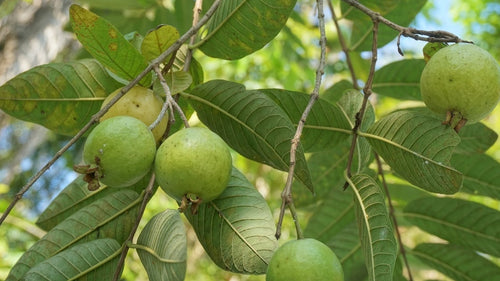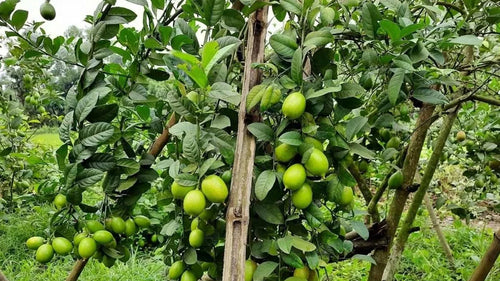Accops Brings Green Gifts to Diwali: A Tree Plantation Initiative in Agroforestry
Accops, a leader in secure access solutions, has taken a meaningful step toward environmental sustainability with its Diwali-inspired tree plantation Read more
Project Update 2

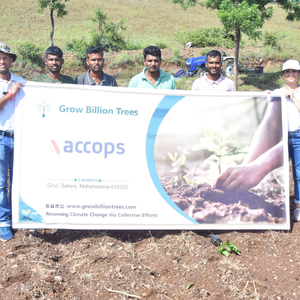
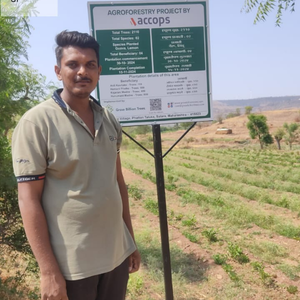
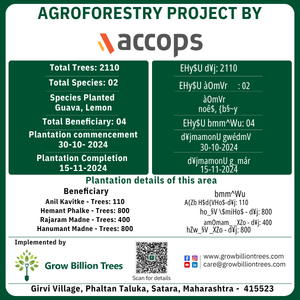
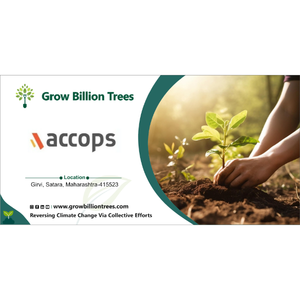
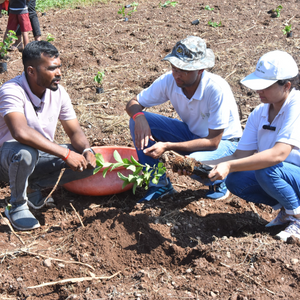
Project Update 1
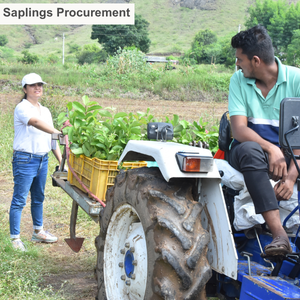
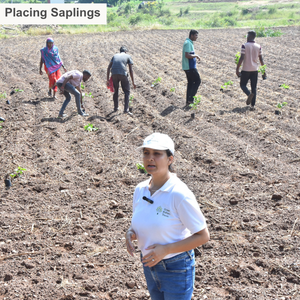
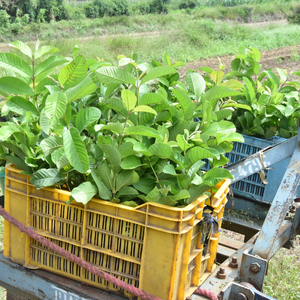
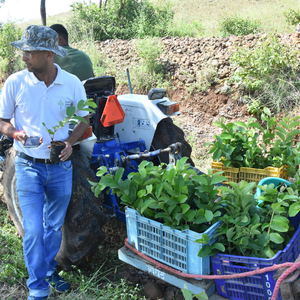
Digital Forest
Forest with 2,110 Trees planned
Want to plant your tree now?
Plant a Tree @ 299Trees Planted
Accops Brings Green Gifts to Diwali: A Tree Plantation Initiative in Agroforestry
Accops, a leader in secure access solutions, has taken a meaningful step toward environmental sustainability with its Diwali-inspired tree plantation initiative. Known for empowering modern enterprises with agile, flexible, and affordable solutions, Accops extends its ethos of innovation and care to the planet.
This Diwali, Accops has organized a tree-planting initiative in the lush district of Satara, Maharashtra, focusing on the agroforest concept. By planting trees in collaboration with local farmers, the initiative not only contributes to environmental restoration but also uplifts the farming community. Each tree is dedicated to Accops' valued customers, blending business relationships with a lasting impact on nature.
The agroforestry model adopted by Accops integrates tree planting with agricultural practices, enhancing biodiversity, improving soil health, and providing additional income sources for farmers. This initiative reflects Accops’ commitment to creating a sustainable future while celebrating the festival of lights in a socially conscious manner.
By combining technology, customer gratitude, and environmental stewardship, Accops is setting an inspiring example of how businesses can align success with sustainability, making Diwali brighter for people and the planet alike.
No of Trees: 2110
Plantation Location: Village Girvi, Satara, Maharashtra 415523
Plantation Duration: 30th October, 2024 to 15th November, 2024
Name of Species: Guava, Lemon
Species Selection & Its Benefits:
The initiative prioritises the planting of native and locally suited tree species, ensuring high survival rates and fostering long-term ecological stability. By aligning species selection with local market demand, the project not only supports environmental sustainability but also opens up viable income opportunities for farmers. Crucially, farmer consent and active participation play a central role in the species selection process, ensuring the trees integrate smoothly with existing agricultural practices.
To further strengthen its impact, the project strategically focused on farmer income generation and livelihood enhancement by selecting Guava (Psidium guajava) and Lemon (Citrus limon) trees. Recognised for their strong market value and consistent returns, both species are hardy, low-maintenance, and well-adapted to local growing conditions. Guava trees offer reliable income through their high-yielding fruit, while also enriching soil fertility, reducing erosion, and supporting favourable microclimates for intercrops.
Lemon trees, similarly, provide regular harvests, strong local demand, and an added stream of income for farmers. In addition to their economic benefits, both species contribute to biodiversity enhancement, soil health, and greater resilience in farming systems. This carefully considered species selection reinforces Accops' commitment to balancing environmental conservation with the socio-economic upliftment of rural communities.
Beneficiaries Details
|
SN |
Farmer Name |
Google Location |
Village Name |
Plot Size(Acres) |
Guava Planted |
Lemon Planted |
|
1 |
Anil Kavitake |
Girvi |
0.24 acre |
0 |
110 |
|
|
2 |
Hemant Phalke |
Girvii |
1 acre |
800 |
0 |
|
|
3 |
Rajaram Madne |
Girvi |
0.5 acre |
400 |
0 |
|
|
4 |
Hanumant Madne |
Girvi |
1 acre |
800 |
0 |
This initiative has empowered the farmers to adopt agroforestry, allowing them to benefit from improved soil fertility, enhanced water retention, reduced erosion, and a diversified source of income. By integrating trees with agriculture, they have secured an additional livelihood opportunity through fruit trees, ensuring long-term financial stability. This effort not only contributes to environmental sustainability but also strengthens economic resilience, fostering a resilient farming model and contributing to the long-term well-being of the Satara region.
Planting Methodology and Its Advantages
Agroforestry: Accops’ tree plantation initiative is based on the agroforestry concept, a sustainable land management practice that promotes environmental conservation while supporting local sustainability efforts. This initiative contributes to long-term ecological balance while enhancing carbon sequestration and biodiversity. Agroforestry helps improve soil health, enhance water retention, and reduce soil erosion, ensuring sustainable land use. Additionally, it reduces dependence on chemical fertilisers, fosters natural pest control, and creates microclimatic benefits, such as temperature regulation, wind protection, and shade for companion crops.
Accops recognises agroforestry as a strategic approach to environmental sustainability, ecological restoration, and carbon footprint reduction. This initiative reinforces the company’s commitment to responsible environmental practices, contributing to a greener planet and a more sustainable future.
Advantages of Agroforestry
-
Increased Farmer Incomes: This approach helps in increasing the farmer’s income by as much as 3 times. Farmers benefit from diversified income sources, lifting economic resilience.
-
Improved Livelihoods: Agroforestry enhances farmers' resilience to economic and climate-related shocks by creating more sustainable and diversified farming systems.
-
Biodiversity Promotion: Agroforestry supports a diverse range of plants and animals, creating habitats for wildlife and improving ecosystem health.
-
Environmental Sustainability: This model reduces carbon emissions and promotes sustainable land management, aligning with SDG 13 (Climate Action) and SDG 15 (Life on Land).
-
Food Security: Agroforestry enhances agricultural productivity and food availability by integrating fruit-bearing trees with crops, contributing to SDG 2 (Zero Hunger).
-
Carbon Sequestration: Trees planted through agroforestry absorb carbon dioxide, helping reduce greenhouse gas emissions.
-
Climate Resilience: Agroforestry helps mitigate climate change impacts by improving land productivity and fostering biodiversity.
-
Improved Soil and Water Management: Trees enhance soil fertility, reduce erosion, and increase water retention, resulting in more resilient farming.
Activities During Tree Plantation
Accops’ tree plantation initiative, implemented under the agroforestry model, marked a significant step towards sustainable land management and community-driven environmental action. The initiative was thoughtfully executed with the support of Grow Billion Trees, led by Ms. Nidhi Singh, Co-Founder & CEO, and Mr. Satender Kumar, Co-Founder & CIO, whose guidance ensured the success of every stage of the project. The plantation activities began with strategic site preparation—optimizing the soil and layout to blend trees seamlessly into the agricultural landscape.
A collaborative effort between dedicated farmers and enthusiastic volunteers brought this vision to life. Native and fruit-bearing saplings were carefully planted, selected for their ecological benefits, adaptability, and contribution to long-term sustainability. Each step—from planting and spacing to initial watering and care—was carried out with precision to foster healthy tree growth and enhance biodiversity. This initiative stands as a testament to Accops’ commitment to environmental stewardship and its support for empowering local farming communities.
Conclusion Elements
Impact
Direct Impact
|
Parameters |
Values |
References |
|
No. of Trees Planted |
2,110 |
|
|
Green Cover (Acres) |
2.74 |
|
|
Fruit Production Potential (Tons/Year) |
53.3 |
|
|
Income Generation Potential (Rs/Year) |
₹1,915,000 |
|
|
Carbon Sequestration Potential (KG) |
20 |
Small to medium-sized trees can sequester around 10–48 kilograms (22–106 pounds) of CO₂ annually. https://growbilliontrees.com/blogs/knowledge/how-much-co2-can-one-tree-absorb |
|
Carbon Sequestration by 2110 mature trees ( Tons/year) |
42.2 Tons |
No. of Trees x Carbon Sequestration by 1 mature tree per year |
|
Carbon Credit Equivalent |
42.2 |
One carbon credit is equivalent to one tonne of carbon dioxide or the equivalent amount of another greenhouse gas. |
|
Carbon Footprint of an avg Indian Citizen (Tons/Year) |
1.8 |
|
|
Offsets Annual Carbon Footprint of (Adults) |
23 |
Carbon offset by 2110 mature trees per year / Carbon Footprint of an avg Indian Citizen per year |
*This impact analysis is forward-looking (An agroforestry project matures in 3-5 years)
Indirect Impact
Community Impact
-
Empowerment of Farmers: By providing training and resources for sustainable farming practices, agroforestry equips farmers with skills to enhance productivity and adapt to environmental changes.
-
Food Security: The integration of fruit-bearing trees and crops ensures a consistent food supply, improving nutrition and reducing hunger within the community.
-
Environmental Awareness: Community involvement in tree plantation fosters a sense of responsibility for environmental conservation and promotes sustainable practices in daily life.
-
Enhanced Social Equity: Agroforestry initiatives foster enhanced social equity by empowering marginalized farmers with sustainable livelihoods, bridging economic gaps, and promoting inclusive community participation in environmental conservation efforts.
-
Resilience to Climate Change: The diverse and sustainable nature of agroforestry helps communities mitigate the impacts of climate change, including extreme weather events, by stabilizing local ecosystems.
-
Health and Well-being: Green spaces created through agroforestry improve air quality and offer a healthier environment, contributing to the physical and mental well-being of the community
Environmental Impact
-
Carbon Sequestration: Trees act as carbon sinks, absorbing significant amounts of CO2 from the atmosphere, helping to mitigate climate change and reduce greenhouse gas emissions.
-
Soil Health Improvement: Agroforestry enriches soil through organic matter from fallen leaves and roots, improving fertility, structure, and nutrient availability for crops.
-
Erosion Prevention: Tree roots stabilize the soil, reducing erosion caused by wind and water while protecting nearby agricultural fields and water bodies.
-
Biodiversity Conservation: By creating habitats for various species, agroforestry enhances biodiversity, supporting pollinators, beneficial insects, and native wildlife.
-
Water Cycle Regulation: Trees improve water retention, recharge groundwater levels, and reduce surface runoff, contributing to a more balanced and sustainable water cycle.
- Microclimate Regulation: Agroforestry moderates temperature extremes, reduces wind speeds, and increases humidity, creating favorable conditions for crop growth and ecosystem balance.
Achievements
SDG Goals Achieved through Agroforestry
-
SDG 1: No Poverty – Accops' initiative supports marginalised farmers by integrating fruit-bearing trees into agricultural landscapes, creating long-term income opportunities and enhancing economic resilience.
-
SDG 2: Zero Hunger – Agroforestry improves soil fertility, enhances crop productivity, and promotes sustainable farming, ensuring better food security for rural communities.
-
SDG 3: Good Health and Well-Being – The planted trees contribute to air purification, reduced carbon emissions, and biodiversity enhancement, fostering a healthier environment for local communities.
-
SDG 4: Quality Education – Accops' commitment to sustainability includes empowering farmers with training and knowledge on sustainable land-use practices, conservation, and climate-resilient agriculture.
-
SDG 5: Gender Equality – By encouraging inclusive participation in agroforestry, this initiative supports women’s involvement in sustainable farming and economic empowerment.
-
SDG 6: Clean Water and Sanitation – The planted trees enhance soil moisture retention, reduce water runoff, and aid groundwater recharge, ensuring better water conservation.
-
SDG 8: Decent Work and Economic Growth – Accops' initiative creates jobs in tree planting, nursery management, and agro-processing, boosting local economies. Promoting sustainable agroforestry businesses fosters entrepreneurship and enhances financial resilience for farmers through diversified income sources.
-
SDG 9: Industry, Innovation, and Infrastructure – By supporting innovative agroforestry practices, Accops promotes sustainable agricultural infrastructure and long-term environmental impact.
-
SDG 10: Reduced Inequality – The initiative empowers small-scale farmers with alternative income sources and sustainable farming training, helping bridge economic disparities.
-
SDG 12: Responsible Consumption and Production – Accops' commitment to sustainability ensures responsible resource use, promoting organic farming and reducing dependency on chemical inputs.
-
SDG 13: Climate Action – The planted trees act as carbon sinks, absorbing CO₂ emissions and helping mitigate climate change, aligning with Accops' environmental responsibility goals.
-
SDG 15: Life on Land – By supporting reforestation and biodiversity conservation, Accops actively works towards restoring ecosystems and preventing land degradation.
-
SDG 17: Partnerships for the Goals – Accops' collaboration with Grow Billion Trees highlights the power of strategic partnerships in driving sustainability, combining expertise, resources, and community engagement for a greener future.
ESG Achieved through Agroforestry
-
Environmental Impact: Accops' tree plantation initiative integrates sustainable afforestation with ecological restoration, contributing to carbon sequestration, climate change mitigation, and improved air quality. By enhancing soil fertility, preventing erosion, and promoting groundwater recharge, the initiative ensures long-term ecological stability. The plantation also fosters biodiversity by providing habitats for wildlife and strengthening ecosystem resilience, reinforcing the company’s commitment to environmental conservation and responsible land stewardship.
-
Social Impact: Accops has embarked on a unique tree plantation initiative as part of its sustainability-driven gifting program, planting trees to commemorate its valued customers. This initiative not only strengthens business relationships but also creates a lasting environmental impact by promoting sustainability through meaningful contributions to nature. By engaging farmers in plantation activities, the initiative provides income opportunities, supports food security, and enhances rural livelihoods through the long-term benefits of Guava and Lemon tree cultivation. Additionally, the project fosters women’s employment by involving them in various stages of plantation and maintenance, empowering them with sustainable livelihood opportunities. The initiative also promotes environmental awareness and social responsibility among customers and local communities, aligning business success with sustainable development.
-
Governance Impact: Accops' collaboration with Grow Billion Trees highlights its dedication to ethical governance, transparency, and measurable environmental impact. This initiative follows expert-led afforestation strategies, structured execution, and adherence to sustainability standards. By ensuring accountability, responsible corporate governance, and stakeholder trust, Accops sets a benchmark for sustainable business practices, reinforcing its commitment to corporate responsibility and environmental stewardship.
Building Communities
One of the most impactful outcomes of Accops' agroforestry initiative was the sense of connection and shared purpose it fostered among customers, farmers, and environmental partners. By integrating tree plantation into its corporate gifting program, the initiative became more than just an act of sustainability; it evolved into a symbol of gratitude, responsibility, and long-term commitment to a greener future.
-
Empowering Farmers: Farmers were not just involved in the plantation process; they played an essential role in ensuring the trees thrive, benefiting from sustainable agroforestry practices that provide long-term economic and ecological advantages. This initiative empowered them with knowledge, resources, and an additional source of income, reinforcing their connection to environmental conservation and sustainable agriculture.
-
Fostering Partnerships: The initiative brought together Accops, Grow Billion Trees, and local farming communities, highlighting the power of collaboration in creating lasting environmental change. Through this partnership, the plantation was executed with expertise, precision, and a focus on long-term sustainability, ensuring that the trees not only grow but also contribute to biodiversity, carbon sequestration, and improved soil health.
-
Creating a Ripple Effect: By gifting trees to valued customers, Accops inspired a deeper appreciation for sustainability, encouraging businesses and individuals to support green initiatives. The initiative set an example, motivating more companies to explore sustainable corporate gifting while demonstrating that environmental responsibility and business success can go hand in hand.
This initiative reinforced that true sustainability is built through collective action. It was not just about planting trees, it was about planting trust, fostering collaboration, and cultivating a shared vision for a greener, more resilient future.
Commitment by Grow Billion Trees
-
Ensuring Tree Survivability: GBT prioritises native species, continuous monitoring, and soil health improvement using organic fertilisers. These efforts ensure sustainable growth and benefit the farmers and communities.
-
Transparency & Accountability: GBT provides detailed reports on tree growth, survival rates, and carbon benefits, using geo-fencing and regular updates to maintain transparency and effectiveness.
-
Sustainable Plantation Efforts: GBT implements projects that balance environmental, social, and economic goals, addressing issues like urban heat islands and degraded farmlands. These efforts promote ecological balance, livelihoods, and long-term climate resilience.
-
Enhancing Ecosystem Health: By selecting native species and creating diverse habitats, GBT enhances biodiversity and ecosystem resilience, ensuring long-term ecological health and supporting wildlife.
-
Long-Term Impact: GBT’s initiatives tackle environmental challenges, enhance rural livelihoods, foster climate resilience, and promote sustainable development while reducing carbon footprints.
Acknowledgment
We at Grow Billion Trees extend our sincere gratitude to everyone who played a role in the success of the agroforestry plantation project in Girvi, Satara, Maharashtra. This initiative, which harmonises environmental conservation with community empowerment, would not have been possible without the collective dedication of visionary organisations and passionate individuals.
To Accops: We are deeply grateful to Accops for their inspiring commitment to environmental conservation and community development. To celebrate the spirit of Diwali, Accops initiated a special tree plantation drive in the vibrant district of Satara, Maharashtra, embracing the agroforestry model. By partnering with local farmers, this initiative not only supports ecological restoration but also strengthens rural livelihoods, offering farmers long-term economic benefits.
Adding a meaningful touch, each tree planted is dedicated to Accops’ valued customers — a gesture that beautifully weaves together gratitude, sustainability, and lasting impact. Through this initiative, Accops has demonstrated true leadership in integrating business success with environmental stewardship and social responsibility. Their efforts contribute significantly towards building a greener planet and empowering communities for a more sustainable future.
To the Farmers of Girvi, Satara: Your trust and commitment to adopting agroforestry practices have been inspiring. By integrating Guava and Lemon trees into your farming systems, you have not only enhanced the land's fertility but also contributed to sustainable agricultural practices. Your efforts to improve the ecosystem and the livelihoods of future generations are commendable. We are honoured to be part of this transformation and are excited to see the positive impact you continue to make.
To Our Ground Partners and Volunteers: Your expertise, passion, and tireless efforts have ensured the successful execution of this project. Through our collective dedication to sustainability, we have demonstrated that strategic partnerships and shared environmental responsibility can lead to tangible, long-term benefits for people and the planet.
Through this collaborative effort, we have taken meaningful steps toward restoring ecosystems, strengthening rural economies, and promoting responsible environmental stewardship. This marks the beginning of an enduring commitment to a greener, more sustainable future, and we look forward to continuing this journey together.
Thank you for your unwavering support and dedication to sustainability.
Closing Remarks
In conclusion, the collaborative efforts of Accops and our partners have laid a strong foundation for meaningful, sustainable change. By integrating environmental restoration with the empowerment of local farming communities, the initiative not only contributes to ecological health but also enhances the income and livelihoods of farmers.
This project demonstrates the powerful impact of aligning business objectives with social responsibility, providing farmers with long-term economic benefits through agroforestry while improving the surrounding environment. As we move forward, we remain dedicated to creating more such opportunities that foster sustainable livelihoods, strengthen communities, and ensure a greener, more resilient future.
We look forward to continuing this journey, building on the success of this initiative, and inspiring other organisations to embrace sustainability while making a positive difference in the lives of farmers and the environment alike.
Together, we grow a greener tomorrow!
Trees for Corporates
Trending
Most Popular
Accops Agroforest Tree Plantation
Behind every tree planted by Accops is a story of partnership with farmers. By involving the local farming community in their agroforest initiative, Accops has empowered livelihoods and strengthened environmental stewardship. Farmers benefit from better soil, additional income, and thriving ecosystems, while Accops earns the title of eco-ally. Together, they’re planting not just trees but seeds of change for a sustainable future.
FAQ
What is the purpose of Accops' tree plantation initiative in agroforests?
Accops’ tree plantation initiative aims to restore balance between forestry and agriculture. By planting trees in an agroforest layout, we create an ecosystem that promotes biodiversity, improves soil health, and supports sustainable land use. This approach helps fight climate change while contributing to environmental and community well-being.
What are the benefits of agroforestry?
Agroforestry offers many benefits, including better soil health, increased biodiversity, and enhanced carbon sequestration. Trees in agroforests improve crop resilience, prevent erosion, and even boost agricultural productivity. Agroforestry is an eco-friendly practice that combines forestry with farming, creating a more sustainable land-use model.
How does Accops’ tree plantation initiative help fight climate change?
Our agroforest initiative supports carbon sequestration, as trees absorb CO₂ and store it in their trunks, roots, and soil. This reduces greenhouse gases in the atmosphere, which helps combat climate change. By creating green spaces, we’re also building a natural buffer against environmental degradation.
Why is tree plantation important for Accops?
Tree plantation aligns with Accops’ commitment to sustainability and social responsibility. By planting trees in agroforests, we contribute to environmental health, community welfare, and climate resilience. Tree plantation is a long-term investment in the planet’s future, making it a core part of our mission.
Who manages the tree plantation activities in Accops' initiative?
In our agroforest initiative, experienced local farmers manage all planting and maintenance activities. They prepare the land, plant trees, and ensure proper care for saplings. This collaborative effort not only supports local livelihoods but also enhances the effectiveness of our plantation projects.
What is the environmental impact of Accops’ tree plantation initiative?
Our tree plantation in agroforests helps improve air quality, conserve water, and enrich soil. By increasing green cover, we create habitats for wildlife, improve carbon capture, and restore ecological balance. This initiative positively impacts the environment by reducing pollution and fostering biodiversity.
How does Accops contribute to the community through its agroforest initiative?
Accops collaborates with local farmers, providing them with opportunities to manage the tree plantation. This partnership supports community livelihoods while enhancing agricultural sustainability. By involving local expertise, we’re creating a shared commitment to environmental stewardship and social progress.
How does agroforestry improve soil health?
Agroforestry enhances soil health by adding organic matter and increasing nutrient availability. Trees in agroforests prevent soil erosion, retain moisture, and promote beneficial microbial activity. This enriched soil improves crop productivity and resilience, making the land more sustainable for agriculture.
What type of trees are planted in Accops' agroforest initiative?
We select native tree species that are well-suited to the local environment. These trees grow harmoniously with nearby crops, enhancing biodiversity without disrupting the agricultural landscape. Native species also adapt well to local conditions, ensuring better growth and ecosystem benefits.
How does Accops' partnership with Grow Billion Trees benefit the environment?
Our partnership with Grow Billion Trees amplifies our environmental impact. With their expertise in large-scale plantation, we’re able to expand green cover and improve agroforestry practices. Together, we’re creating more sustainable ecosystems and advancing global sustainability goals through collaborative reforestation efforts.
- Choosing a selection results in a full page refresh.
- Opens in a new window.


